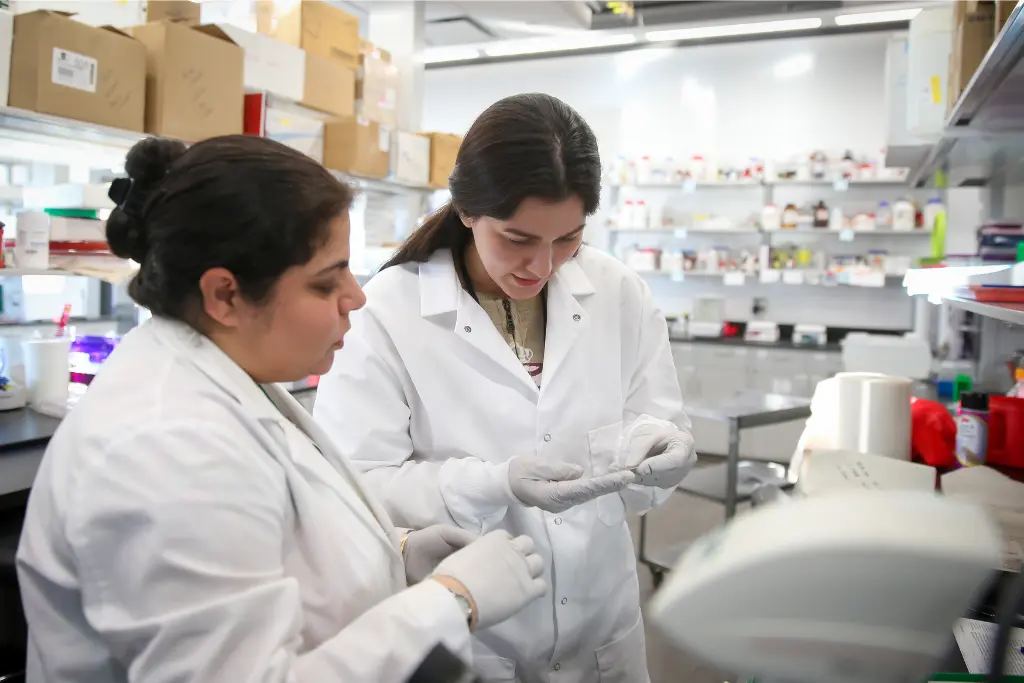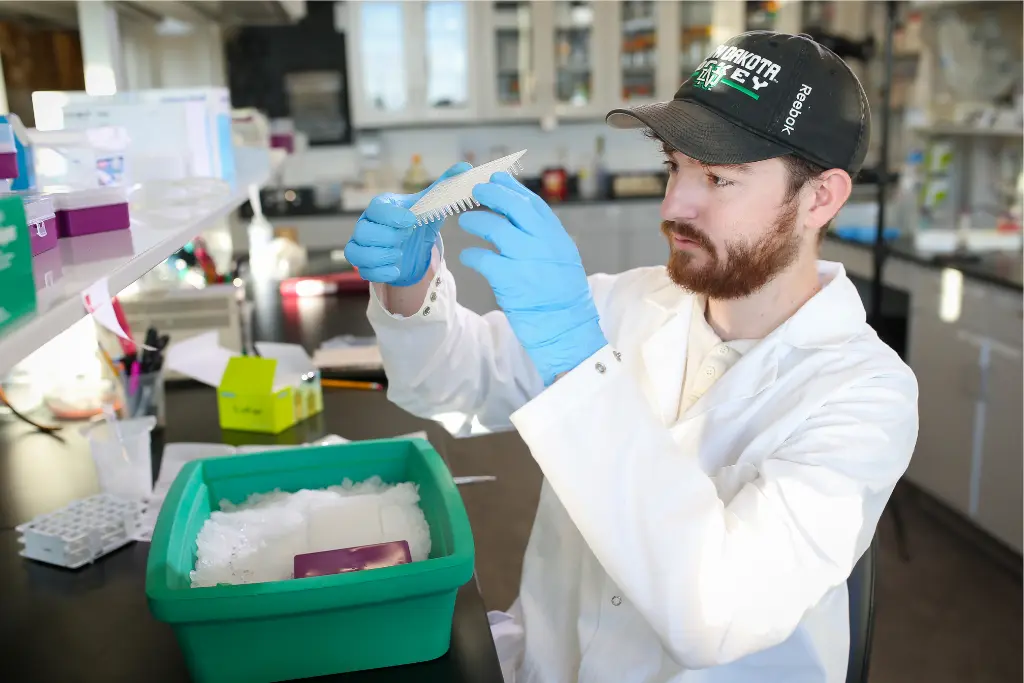
How to Become a Biomedical Engineer?
Imagine a world where medical breakthroughs such as pacemakers, artificial organs and advanced diagnostic systems don't exist.
Request Information
Without these life-saving innovations, our approach to health care would be drastically different. Biomedical engineering is the pioneering field behind these technologies, combining engineering principles with biomedical sciences to profoundly enhance healthcare.
If you're drawn to the idea of changing lives through cutting-edge technology and science, pursuing a career in biomedical engineering might be the perfect choice for you. Curious about how to become a biomedical engineer? Keep reading to learn the steps to enter this transformative field.
What Does a Biomedical Engineer Do?
Biomedical engineers are crucial in connecting medicine and engineering, applying their expertise to advance healthcare treatment and technology. Their work helps innovate and implement new medical technologies that improve patient care.
Biomedical engineers' responsibilities vary widely and can include:
- Designing biomedical equipment that assists with the diagnosis or treatment of medical conditions, such as imaging equipment, artificial organs and prosthetic limbs.
- Developing software that is used to run medical equipment or to analyze medical data, such as software for monitoring heart or brain activity.
- Researching to develop new materials, devices and procedures for medical use, often working in laboratories or for pharmaceutical companies on drug therapies or innovative surgical procedures.
- Collaborating with medical professionals to tailor engineering solutions to clinical needs.
- Training doctors, nurses and other medical staff on the proper use of biomedical equipment.
- Ensuring compliance with regulatory standards.
How to Become a Biomedical Engineer
Biomedical engineering offers a diverse range of career paths, each demanding a strong educational foundation to ensure professionals are equipped with the necessary theoretical knowledge, skills and experience to excel in their roles.
In the following sections, we will explore the essential stages and biomedical engineer requirements to pursue a successful career in this impactful field.
Participate in AP Classes Throughout High School
A strong foundation in science and mathematics is essential for anyone aiming for a career in biomedical engineering. High school students should take advantage of Advanced Placement (AP) classes in crucial subjects like biology, chemistry, physics and mathematics.
Doing well in these courses not only prepares you for the challenging college curriculum in engineering but also helps you earn college credits. These credits can reduce your future academic workload.
More importantly, AP classes sharpen your analytical and critical thinking skills, which are vital for solving complex problems in biomedical engineering. This preparation sets the stage for advanced studies and innovation in the field.

Earn a Bachelor's Degree
Next, obtaining a bachelor's degree is fundamental to becoming a biomedical engineer. Aspiring engineers should aim for a bachelor's degree in biomedical engineering or related fields, such as mechanical engineering or electrical engineering, depending on their interests and career goals.
These programs offer comprehensive curricula encompassing a broad range of relevant topics, including biomechanics, bioinformatics, systems physiology and core engineering principles. Beyond imparting essential technical knowledge, these degrees are designed to integrate theoretical learning with practical application, thereby preparing students to tackle real-world challenges effectively as they transition from academic environments to professional settings.
Additionally, students may choose to enrich their education by combining a complementary field such as computer science, chemical engineering or materials science with a minor in biomedical engineering. This interdisciplinary approach can broaden their expertise and open up additional opportunities in specialized areas of biomedical engineering.
Additionally, for those looking to deepen their knowledge and enhance their research skills, pursuing graduate degrees like a master's or Ph.D. in biomedical engineering can be highly beneficial. These advanced degrees allow for greater specialization and leadership opportunities in research, development and academia, further paving the way for innovation and advanced problem-solving.
Gain Relevant Experience
Practical experience is invaluable in the biomedical engineering field. Engaging in internships, cooperative education programs (co-ops) or research projects during one's undergraduate career offers critical exposure to the industry's applied aspects. These opportunities allow students to use their classroom knowledge in practical scenarios, dealing with challenges in the engineering aspect of healthcare.
Additionally, such experiences are crucial for personal and professional development, enhancing problem-solving capabilities and building robust professional networks beneficial for long-term career growth. They significantly improve students' employability by providing evidence of their skills and adaptability to potential employers.
Earn an FE or PE license
Obtaining a Fundamentals of Engineering (FE) license and a Professional Engineer (PE) license is a valuable pathway for biomedical engineers seeking to solidify their credentials and demonstrate their commitment to professional excellence.
The FE exam is typically taken upon graduation from an accredited engineering program, serving as the first step toward becoming a licensed engineer. It tests the applicant's knowledge of basic engineering principles and their application in a practical environment.
After gaining sufficient work experience, usually four years, biomedical engineers can sit for the PE exam in their specific discipline. This credential is essential for those who wish to lead research teams, be the principal engineer on healthcare projects or offer their services directly to the public.
Holding a PE license not only enhances a biomedical engineer's job prospects and potential for career advancement but also upholds the safety, health and welfare of the public by ensuring that engineering services are provided by qualified professionals. This certification places engineers at a distinct advantage by endorsing their expertise and dedication to the highest engineering practice standards.
Pursue Professional Certifications
Additionally, professional certifications are crucial in advancing a career in biomedical engineering. Certifications such as the Certified Biomedical Equipment Technician (CBET) or Certified Clinical Engineer (CCE) validate a professional's expertise and proficiency in specialized domains of biomedical engineering.
These credentials, obtained by passing rigorous examinations, reassure employers of a candidate's commitment to excellence and adherence to high industry standards. Moreover, certified engineers often find better job prospects and opportunities for advancement, as these certifications highlight their skills and dedication to their profession's ethical and technical standards.

What Skills Does a Biomedical Engineer Need?
Biomedical engineers need a diverse set of skills to succeed in their field, including but not limited to the following:
- Strong research skills
- Effective communication
- Advanced mathematical skills
- A strong grasp of engineering principles
- Familiarity with biomedical technology, software and tools
- The ability to analyze complex biological and engineering data
- Proficiency in identifying problems and creating innovative solutions
- Precision and accuracy in the design and testing phases
- The ability to manage projects, budgets and timelines while coordinating the work of others
- Understanding and adhering to ethical considerations
- Ability to learn new technologies and adapt to changes in the field quickly
What is a Biomedical Engineer’s Salary?
These professionals enjoy competitive salaries, with the mean annual biomedical engineering salary being around $108,060. These salaries can range significantly from about $63,420 to over $159,130, reflecting the spectrum of expertise, roles and responsibilities within the field.
Several key factors play a role in shaping the salary structure for biomedical engineers. Educational background is a primary influencer; those with advanced degrees, such as a master's or Ph.D. in biomedical engineering, often access higher-paying positions that demand deeper knowledge and more specialized skills. Similarly, professional certifications can further enhance an engineer's qualifications and potential earnings.
Work experience is another crucial determinant. Biomedical engineers with more years in the field typically see a progression in salary as they take on more complex projects or move into senior or managerial roles. For instance, engineers with over a decade of experience can earn significantly more than their counterparts just beginning their careers.
Additionally, specific industry sectors and geographical locations also contribute to the diverse earning potential across the profession.
Conclusion
By following the outlined steps—from acquiring a solid educational foundation to gaining practical experience and obtaining relevant certifications—students can embark on any biomedical engineering career path they desire. UND presents an excellent option, offering undergraduate and graduate programs as well as an accelerated bachelor's and master's degree in biomedical engineering.
UND is deeply committed to advancing biomedical engineering and understanding its significance in improving and saving lives. Moreover, it is part of a multi-university research group, the Center to Stream Healthcare In Place (C2SHIP), working to develop healthcare technologies for in-place care.
So join us and you won't just be studying biomedical engineering; you'll be stepping into a future where you can make a significant impact on healthcare.
FAQs
Biomedical engineers often face challenges such as rapidly changing technology that requires continual learning and adaptation, regulatory compliance for medical devices and the need to balance technical design with patient safety and effectiveness.
Yes, biomedical engineers can work internationally, as the demand for advanced medical technologies and healthcare solutions is global. Opportunities abroad may vary based on local regulations and the need for specific expertise in medical device development and biomedical research.